This summer we had two excellent, bright, curious and enthusiastic high school students Anna and Tiffany as interns at Superangel.
In a mere month, they delivered absolutely everything they were asked to do with a cheerful, helpful attitude and infectious energy, including:
- Helped Jaan with data entry
- Wrote down what VC is, so it can be used with next interns
- Provided sourcing network ideas for the Nordics
- Wrote research reports on thesis topics
- Quantitatively analysed our decision making weights of criteria
- Proposed questions for two founder calls based on the research
- Looked for new deals
- Got a fundraising deck from a founder
- Listened in on rants about LLMs, VC and other random topics
- Read the investment process and criteria document under development and provided questions and commentary that helped clarify the writing
We were lucky to have these emerging superstars in our team. Here’s their take.
What Is Your Background?
Anna: I’m a rising freshman at Harvard College, planning to concentrate in environmental sciences and engineering, or statistics. I recently graduated from Gustav Adolf Grammar School with highest honors in the mathematics and English specific class. At GAGS I served as the President of the Student Council, a member of the school’s administrative board, and organized events on politics and sustainability for the school. Additionally, I’ve conducted research in the areas of raw materials and the environment and participated in international academic competitions.
Tiffany: I’m a High School student at EBS and my heart lies in the disruptive startup ecosystem. I’ve experienced the highs and lows of being an entrepreneur, from a humble lemonade stand to being a tech startup founder. My most recent ventures and experiences have come from my passion for mental health.
Why Venture Capital?
Anna: Venture capital appeals to me due to its lean, innovative, and adaptable nature. I thrive in environments that are fast to implement new ideas and bring out their practical value. Furthermore, venture capital provides a platform where I can showcase my strengths in creative problem-solving and analytics. It is inspiring to see how a good idea and the right team can transform the way people live their lives and how countries operate.
Tiffany: I took an MIT college course on the fundamentals of entrepreneurial finance, and the section about VCs gave me a new perspective on the startup ecosystem. And the venture into this uncharted territory has led me to Superangel HQ in Telliskivi. To me, VCs provide the momentum needed to propel innovation and support it. So, between paving the way for a new generation of VCs and helping me learn how the jam is made right from the source, it was a no-brainer.
Startup you’d invest your tuition fee in
Tiffany: I’m compelled to say I’d invest in my own startup, along with all my spare change and sleeping hours. But stepping from founder to VC shoes, I’m really passionate about the renewable energy and deep tech sector (köh köh Superangel). As of right now, I’m excited to see how startups tackle the challenges of big data.
What Book/Podcast Do You Most Frequently Recommend To Friends And Family And Why?
Anna: I often recommend Oxford’s Very Short Introductions to friends and family. Books from this series provide a concise yet insightful nous into various subjects, helping readers decide whether to delve deeper into specific topics. Recently I read James Fulcher’s Capitalism: A Very Short Introduction, which provided valuable perspectives on economic systems. I also enjoy books that explore the intertwining of natural laws and society, like The 80/20 Principle by Richard Koch. Furthermore, David Attenborough’s A life on our planet is a positively motivating read about the environmental crisis where he draws from decades of experience to present a vision for the future.
Tiffany: I like to read things that humble me in my knowledge. If I don’t have to google a word or underline a new thought every few minutes, then I’m bored. On my nightstand at the moment, you can find ”Denial of Death” by Ernest Becker, some Albert Camus, and a sprinkle of Dostoyevsky. Although I’m a music not a podcast person, my exception is Philosophize This. A little unorthodox, but give me 3 more years in the startup scene, and I’m sure I’ll graduate to Tim Ferriss or a16z.
What did you learn and how did you like it at Superangel?
Anna: The inner workings of rapidly growing businesses were new to me at the start of the internship. Thus, getting to know how people’s expertises complement each other to make a smoothly operating company was really interesting. During the internship I got to think about how the macro environment influences the micro scale and vice versa. For example why certain types of batteries are becoming more popular, what that means for battery manufacturers, and how new developments could reorganize that picture. The realm of deep-tech startups is captivating, and it’s an area I’m eager to engage more deeply with. Thank you to Kärt Siilats for the opportunity! I very much appreciate that I got to work with and learn from the amazing team at Superangel who are at the top of the heap and also genuinely nice and welcoming people.
Tiffany: It was really a “stepping through the looking glass” type of experience. I realized how invaluable an investor’s perspective on the entrepreneurial landscape is. My favorite aspect of the internship was its broadness and fluidity. Which gave me the opportunity for self expansion in different fields. Thanks to the awesome team at Superangel, I got to really feel that I helped the community and made an impact. Which is the best way to spend your summer, in my opinion. Expanding horizons🚀
We are thrilled to have Celine Pattyranie join our team as an Associate and with that, officially open our offices in Stockholm! 🇸🇪
Celine joins our investment team to help us expand Superangel’s footprint in the Nordics. The Nordics are a known hotbed for impactful startups and with our focus being on early-stage founders building impactful technology, doubling down on the region is really a no-brainer.
Celine brings a wealth of operational experience with her, latest one being at Lassie, making her a great fit to Superangel’s entrepreneurial mindset and a fantastic person to establish relationships with early-stage founders.
Everybody, meet Celine
I’m born and raised in Sweden, currently living in Stockholm. Besides Sweden, I’ve also been living in Spain and the UK. My interest in the startup ecosystem sparked while working in the UK supporting Swedish startups interested in expanding to the UK as part of the Swedish Chamber of Commerce for the UK.
My most recent experience is from a Swedish InsurTech startup Lassie, where I was part of their journey from pre-seed to raising a series A. I got to experience everything from launching and getting the first customers, getting even more customers and growing in the home market, to just recently launching in a second market. As you can imagine, it was a fantastic experience and a steep learning curve!
Enthusiastic about the early days of startups – well, Celine, you’re in the right place
I enjoy being part of the start of a company and joining an early-stage VC gives me the opportunity to support different startups on their growth journeys. Additionally, the team at Superangel have extensive operational experience and there is so much to learn from everyone in the team – learnings I hope to spread to my network in return!
If she’s not talking with founders, she’s enjoying the outdoors
In springtime, you’ll most likely find me outside, probably running or walking in the park. On the same theme, I love trying out different types of exercises, preferably with a group of people.
If you like podcasts, you and Celine will get along just fine!
I am a big fan of podcasts (hint; I need something to listen to while running/walking). I mostly listen to Swedish podcasts and have an interest in lifestyle/health topics. However, it’s not too much fun for all non-Swedes to hear me list a bunch of podcasts in Swedish, so here are a few tips for anyone interested in the startup/VC ecosystem – “The Twenty Minute VC”, “Associated Podcast” and “Under 15” (one for my fellow Swedes).
Welcome to the team, Celine! Excited to have you!
We are thrilled to have Jaan Kokk join our team as an Analyst! He’s a much awaited addition to the team, helping us scale our portfolio management and investment processes – much needed after 44 investments and a new fund!
Jaan has previously worked in finance for companies like Swedbank, Certific, kood/jõhvi, and many others. Although he’s very much a numbers person, he’d like his superpower to be “spaghetti coming out of his finger tips”. Oh well… But then again, who wouldn’t love pasta?!
Everybody, meet Jaan
I am a financial advisor with a knack for turning numbers into magic. With a background in both tech start-ups and traditional finance, I have a unique ability to understand the financial implications of even the most futuristic decisions. I have built entire financial reporting systems from scratch, helped secure bank financing, raise rounds, sell enterprises, and sort out a bunch of other financial challenges. But don’t let my financial prowess fool you, I have a sense of humour and great experience in product development and digital sales funnels.
So Jaan, why Superangel? And make sure to sugarcoat 😉
I wanted to be part of a team with a great attitude who could turn numbers into actual gold. And Superangel fit the bill perfectly!
They’ve built a super-network of connections that would make even Tony Stark jealous. With that they don’t just help start-ups, they also help founders and the team grow as well, bringing in personal leadership and business coaches. It’s like having your own personal superhero squad ready to come to the rescue when needed. And the best part, they have skin in the game, so when the start-ups succeed, we all win! Sign me up!
A skater boy, you say?
If I am not behind a laptop, you will most likely find me on a skateboard roaming about somewhere on the streets of Tallinn.
What book/podcast do you most frequently recommend to friends and family and why?
As of late that would be “Switch – How to change things when change is hard”. It provides practical strategies for overcoming resistance and successfully implementing change in both personal and organizational contexts. If you are operating in an environment of constant change and a lot of uncertainty then the book is definitely a good read – hint-hint founders.
Onwards, Jaan!
Water and dirt bounce off your car sensors, switches turn on and off bacteria growth, predictive screening of new composites for next-level batteries, drone-delivered groceries. These were just a few exciting high-tech products developed by R&D intensive teams participating in the second edition of Science Base Camp.
Who are the most promising R&D intensive teams in Nordics and Baltics? How to get these great products as fast as possible to mass adoption and benefit our society? These questions are the reason Superangel investment fund has launched Science Base Camp, which has become the biggest investment readiness day in Nordics and Baltics.
“Science Base Camp is like a gym where your personal trainer will identify your weak points, give you a training plan, and motivate you to power through it.” – Science Base Camp participant
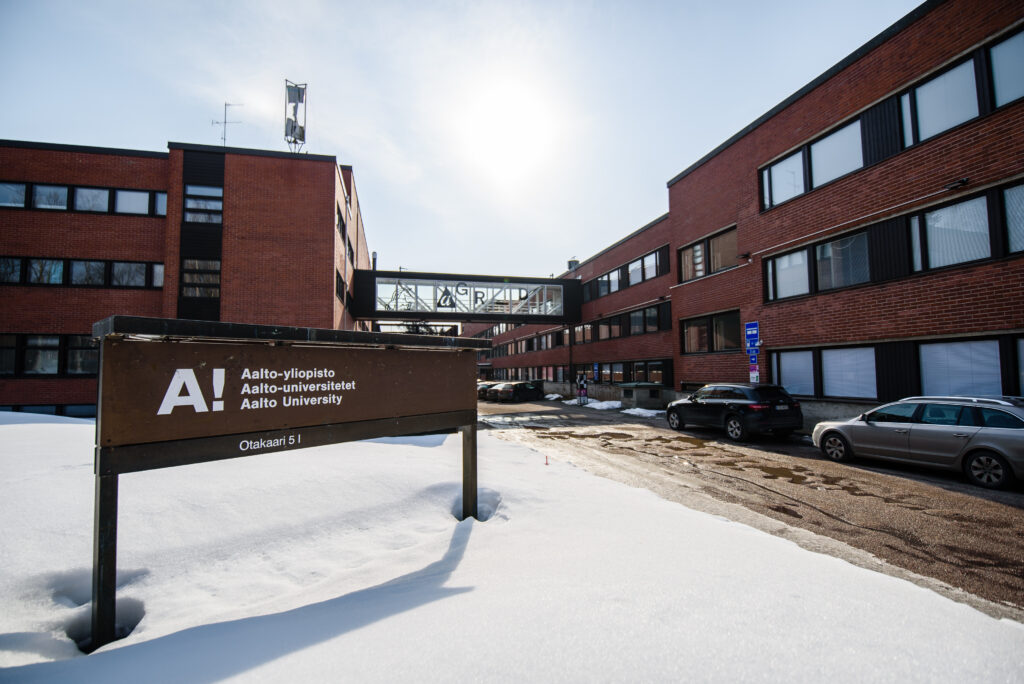
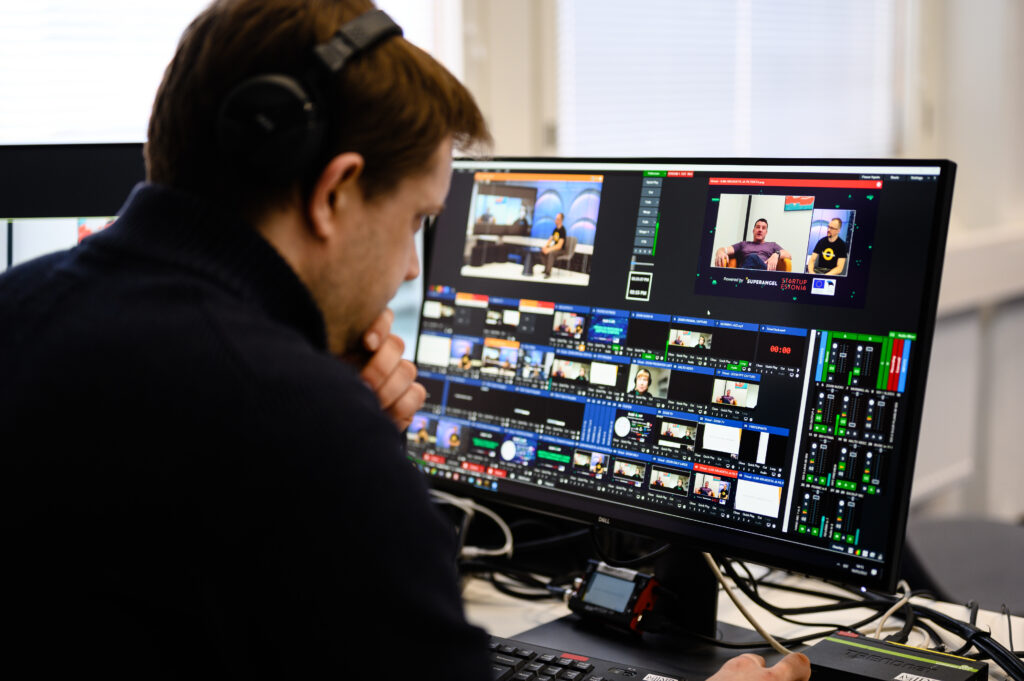
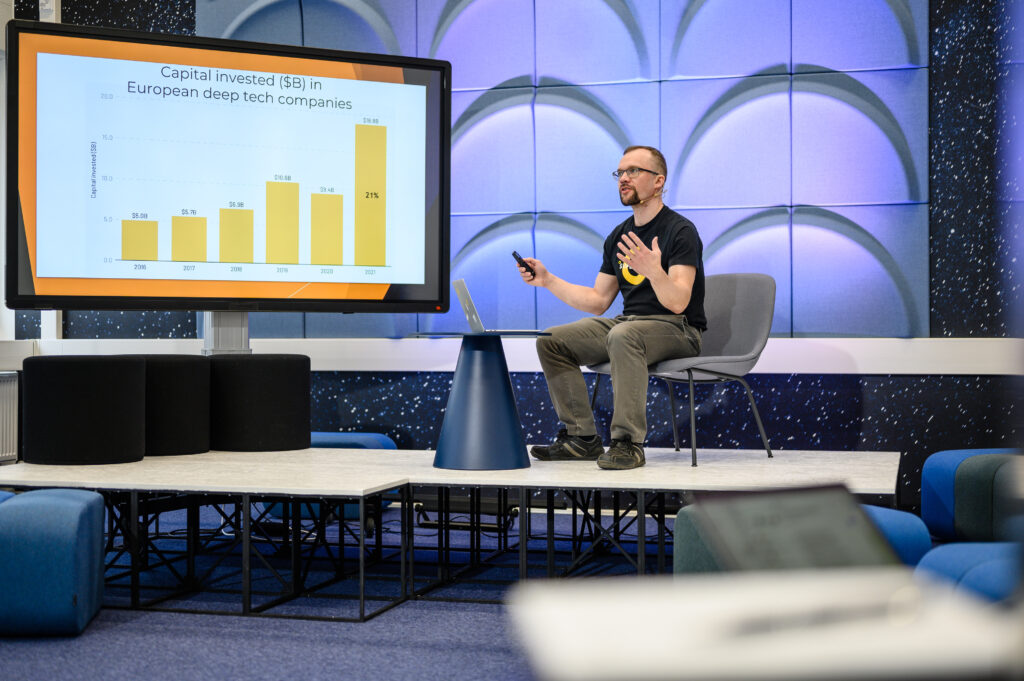
Designed For Technology-Based Teams To Accelerate Commercialisation
Scientific breakthroughs can help solve the most challenging problems in climate change, healthcare, or society’s development. Yet it can take a long time before science-based solutions reach the mass market.
What Superangel has learned from experience is that having meaningful discussions with investors instead of pitching to them can help teams from universities to find shortcuts and move faster. Investors’ insights into the market can help teams understand the potential use cases of their technology and how to speed up commercialization cycles.
“Talking to investors and academic audience are like speaking two different languages.” – Science Base Camp participant
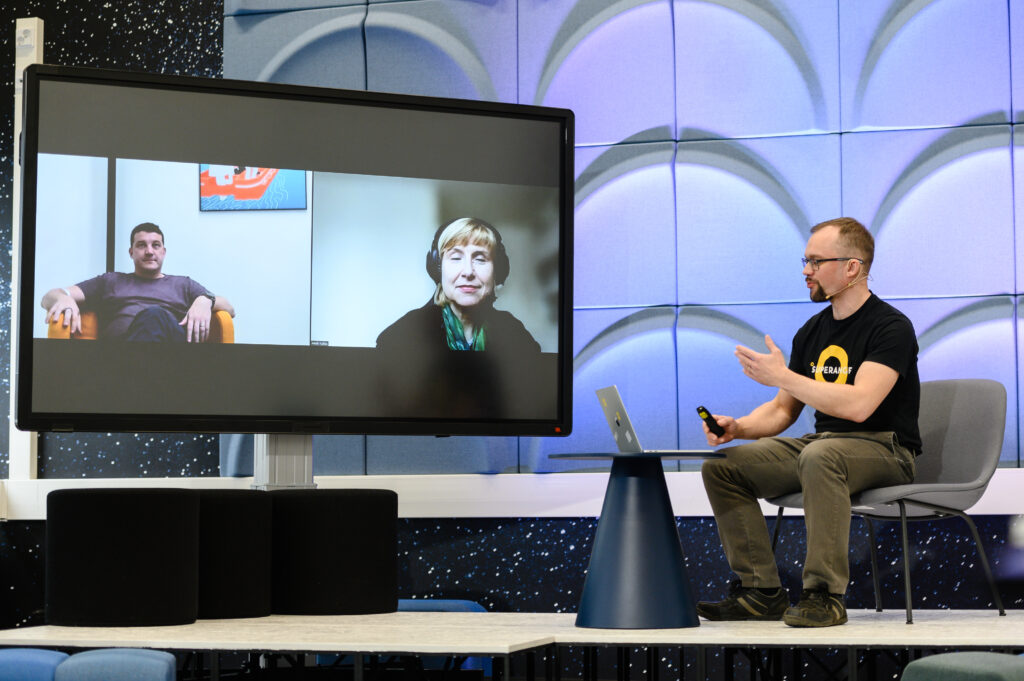
Science Base Camp is designed to create the space for meaningful discussions between early-stage R&D-intensive teams and deep tech investors. To prepare the teams for the discussions and beyond, we conducted sessions on key topics:
- What do investors want from deep tech teams?
- How to tell the story of your product and startup to people who do not have your background?
- How to find first paying customers for deep tech products?
- What are the best practices for cooperating with corporations?
- What are the trends of deep tech investing in Europe?
“You should not try to please all investors.”
“You should not try to please all investors” was feedback from a venture capitalist to a young first-time founder. The investor followed it up with recommendations on which decisions the founders should make to move forward and which type of investors she should seek, and which ones to avoid.
Such honest feedback is infrequent and hard to get. At Science Base Camp, there were over 25 investors present and over 30 sessions delivered in 3-hours.
In the evening, startup teams got open to feedback from pitch coaches (thank you Wallace Green and Gleb Maltsev) and investors on their 3-minute pitch: what was memorable, confusing, and one friendly piece of advice for the next time.
“It was an excellent fresh outlook to understand what the startup world expects from us and how to orient ourselves there.” – Science Base Camp participant
Even though the main focus is on getting feedback from investors, Science Base Camp works also as a platform for fundraising. Several startups have reported continuing discussions with investors they met at Science Base Camp. One startup was able to get investment commitments already during the mentoring session.
Who Are The 21 Forward-Looking And Innovative Deeptech University Teams From Science Base Camp You Need To Keep An Eye On?
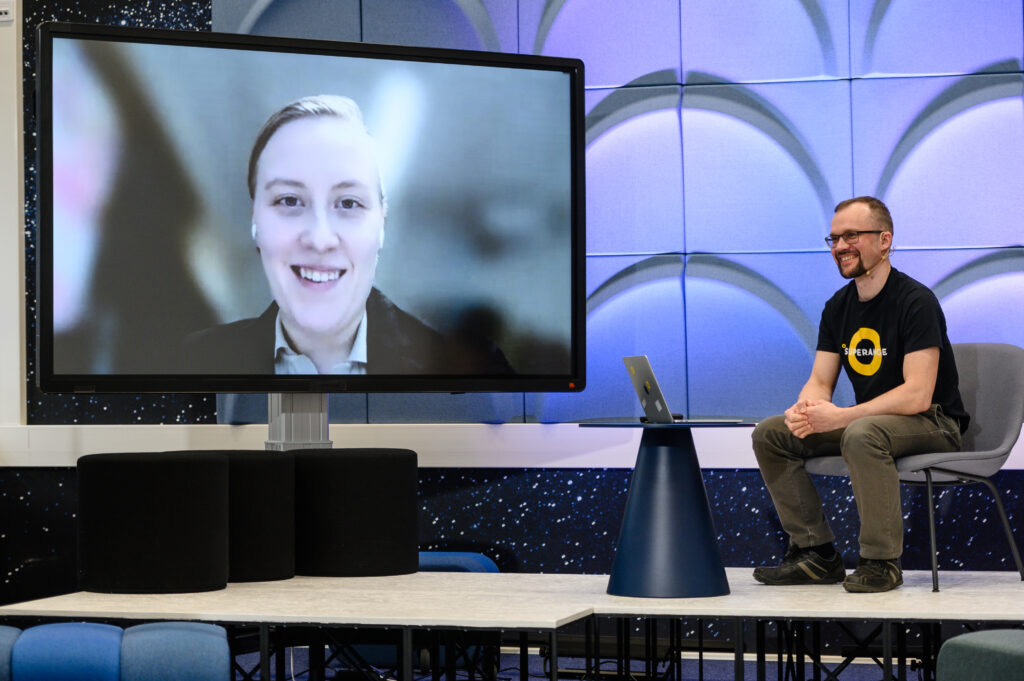
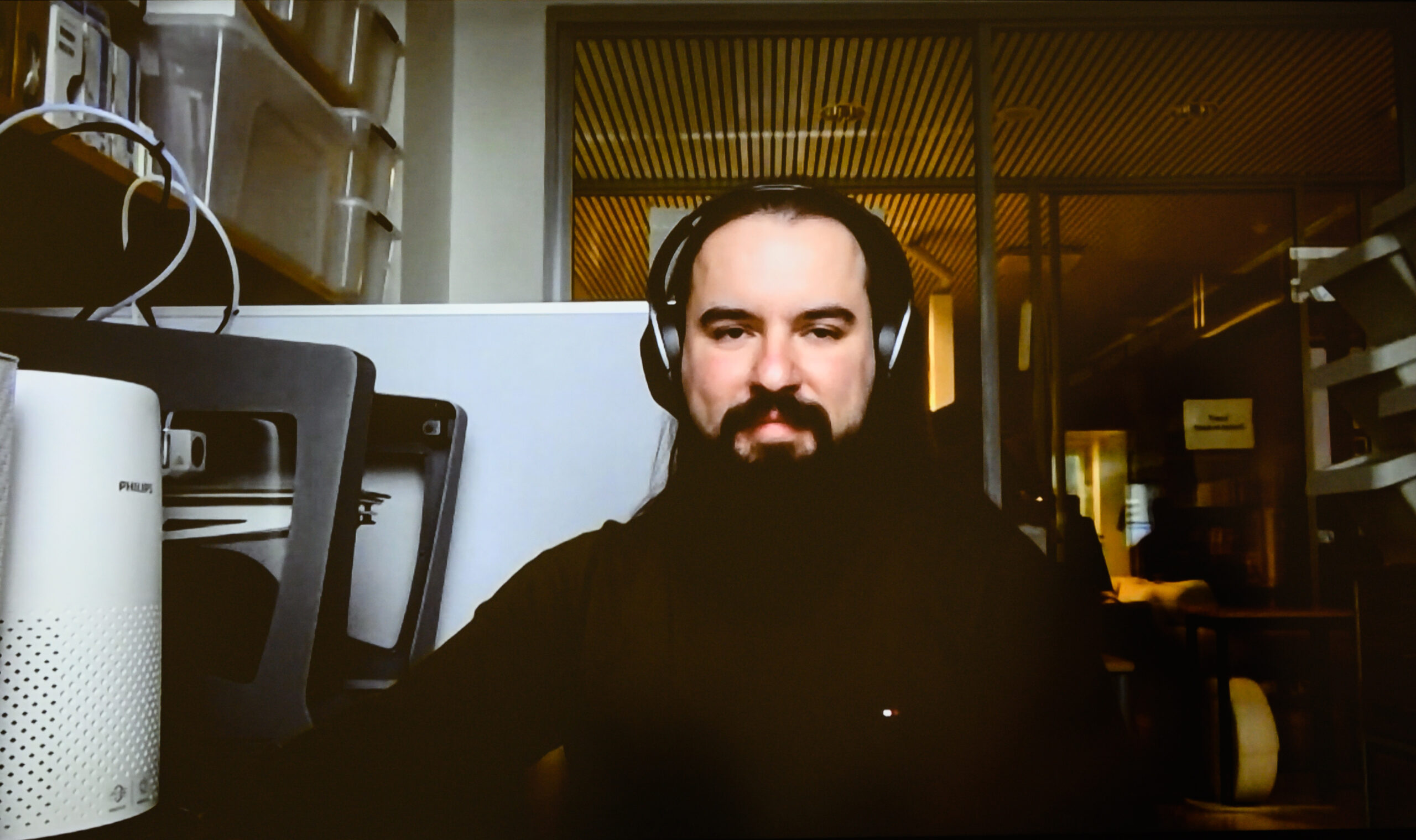
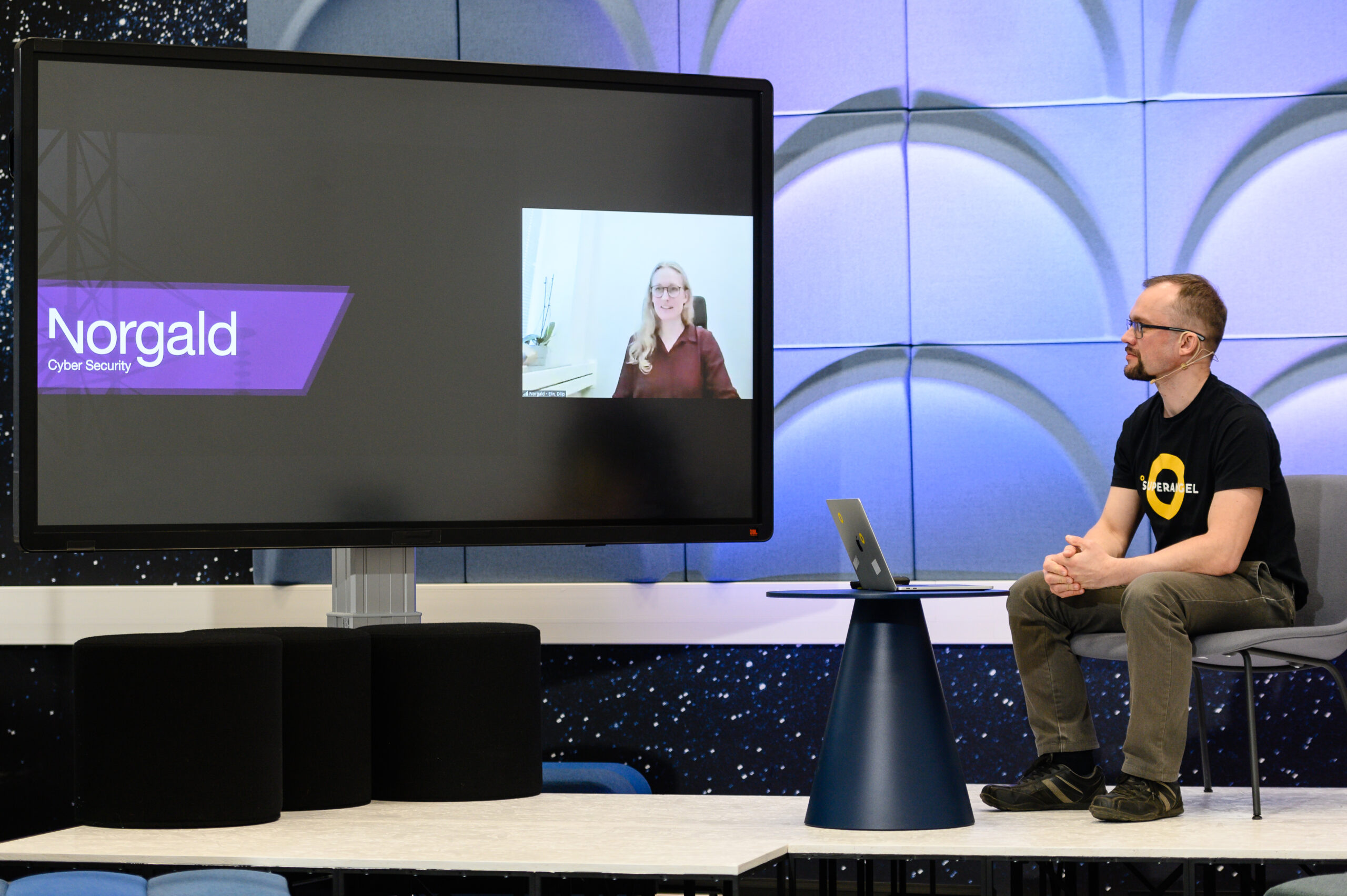
In Science Base Camp 2022, 21 teams from ten universities and science parks from Estonia, Finland, and Sweden got selected to receive insights and feedback from over 25 Pre-Seed to Series B deep tech investors. Here is the list of teams to watch in alphabetical order.
- Aerit offers sustainable drone delivery as a service.
- AIVisionEye has a Smart Damage Detection solution for the highly growing Shared Mobility Industry.
- Better Medicine builds AI-Powered tools for radiologists that enable doctors to diagnose and fight cancer in more efficient and accurate ways.
- CeLLife develops an overall solution to turn waste Li-ion batteries into stable and reliable energy storage, giving them a second life.
- Cleandet offers an AI-driven device to detect invisible contaminants, bacteria, and viruses from surfaces.
- Compular develops an intelligent computational chemistry software for speeding up the development of new batteries by automatically identifying bonds between material structures and technologically relevant properties to enable predictive screening of new compositions.
- Dry and Durable offers the world’s most durable self-cleaning super-water-repellent shields for sensors.
- Measurement Electronics Research Group at Taltech fosters a radical shift from episodic to continuous healthcare using decades of knowledge and experience in discreet and reliable medical data acquisition.
- FaradaIC Sensors has developed miniaturized breath sensors to gather biometric data and provide patients and athletes alike insight into their respiratory health and metabolism.
- GARMENT wearable platform turns daily physical activities into in-game rewards for promoting and encouraging wellbeing.
- Gearbox Biosciences makes bioproduction of chemicals more efficient and sustainable.
- Krattworks builds drones with onboard machine vision and GSM connectivity. Our drone provides fast situational awareness for firefighters, security companies, search and rescue teams, and police.
- Lightcode Photonics changes how service robots see us with the world’s first software-defined 3D camera.
- MIRO provides a Mixed Reality-based visual assistance solution for controlling heavy mobile work machines directly and remotely.
- mTMS provides an automated multi-locus magnetic brain stimulation system.
- Norgald provides cyber security software to create resilient critical infrastructure.
- Nosore develops a smart bed sheet for predicting pressure ulcer risk.
- Parkzia revolutionizes the charging of autonomous e-movers by removing fixed charging stations, charging the e-movers on the go, increasing operational time by 30 %, and saving millions in e-mover fleet investments.
- REPLICA has developed an IP block that gives CPUs 100x better processing performance in complex, real-time, parallel use cases
- Smart Materials makes polyurethane foam production with auxetic features scalable and affordable.
- Vireamed offers a VR exergame solution for remote motor function rehabilitation.
- WINSe develops power by light solutions for applications where electrical wires can’t go.
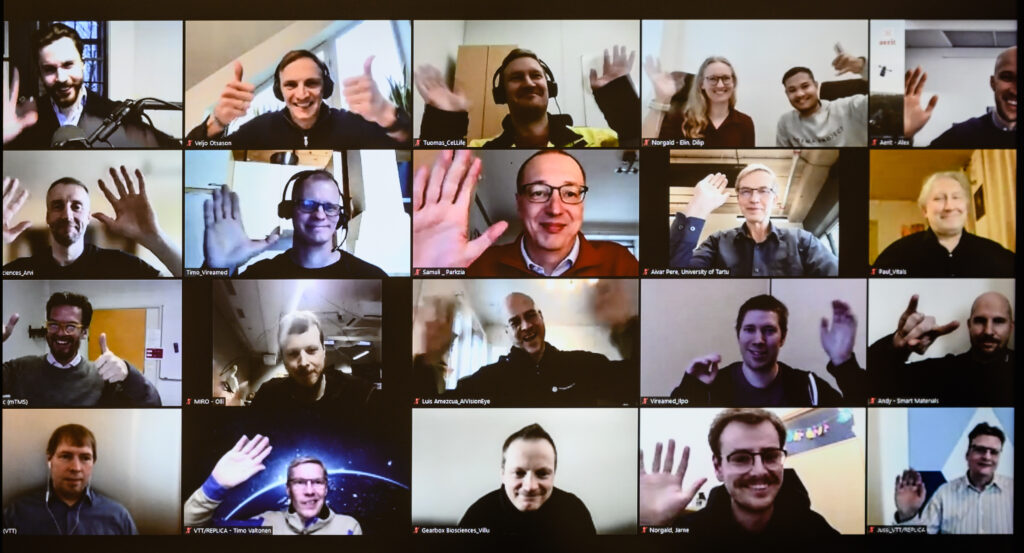
Take a peek into the Science Base Camp.
We are making public some of the content that was presented at the second Science Base Camp 2022.
- Get familiar with the trends of deep tech investing in Europe
- Port 6 story on how to raise funding for a deep tech startup as a university student
- Eyevi Tech story on how to raise €1.8M after you heard 100 times “no.”
We have three more gems for those who are interested:
- Session: What are investors looking for in R&D-intensive companies? Thank you Heidi Kakko & Sten Tamkivi!
- Session: How to launch cooperation with corporations? Thank you Matti Härkönen & Innovestor
- Session: How to find the first paying customers for deep tech products?
If you want to access it, send us a request here.
Organised Together With Leading Universities And VCs
A huge thank you goes out to all of the teams, investors, and partners whose continuous support helps us think bigger and contribute to the development of a better, more impactful society. A special shout out to Aalto Startup Centre and Joel Takala for hosting us in Helsinki.
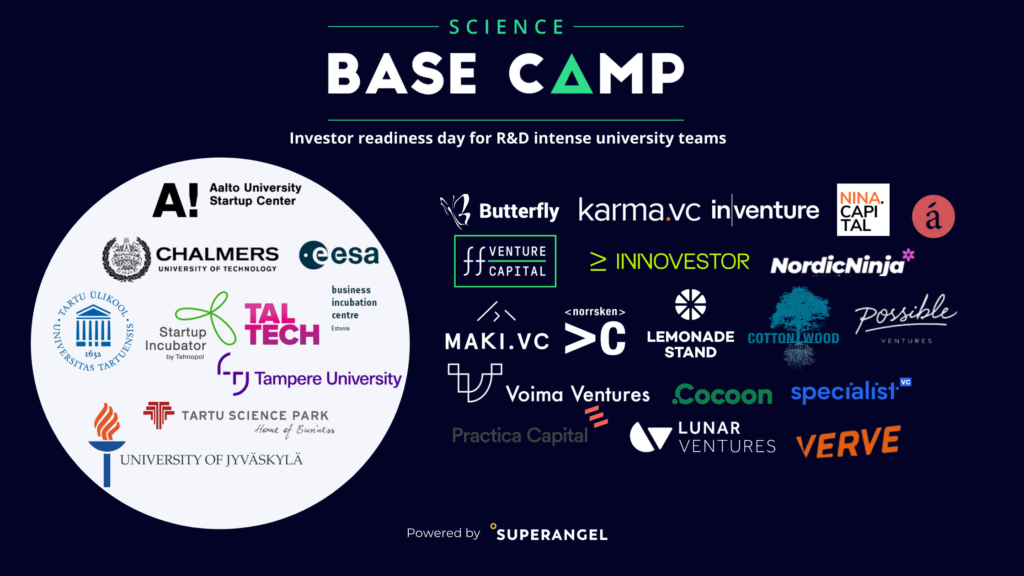
Pictures by Eiko Lainjärv.
We are glad to welcome Vivian to Superangel team for the next 8 weeks. Vivian joined us through 101 Fellowship – a practical program designed for young people who are interested in venture capital. This is the second time Superangel participates in the initiative.
What Is Your Background?
I’m a Master of Finance candidate at Judge Business School, University of Cambridge. My background is in finance and accounting. I previously worked in financial services assurance at EY, where I specialized in banking and capital markets, serving clients from banking, securities brokerage and asset management industries. I then made a transition after completing my CPA qualification program and joined Credit Suisse working in compliance and due diligence. Besides, I recently worked with an impact investment VC to identify market trends and investment opportunities in the APAC EdTech industry.
Why Venture Capital?
I was drawn towards the world of VC mainly because of the fun part – talking to the founders! I enjoy interacting with many highly motivated people and learning about different innovative ideas and disruptive startups that are trying to make real impact, which are truly inspiring. Nevertheless, having just a great idea is not enough. My finance and accounting background could bring added value by putting great ideas to work with effective business planning and help startups pave their paths to success.
Startup You’d Invest Your Tuition Fee In?
Uniswap. (Not only on the strength of its pink unicorn logo) Uniswap’s innovative crypto exchange protocol is stepping up the game by going full DeFi as a first mover. The application of blockchain in the fintech space has certainly proved a success, considering the emergence of crypto unicorns in recent years, such as Binance and Coinbase. A vast majority of these crypto platforms however operate as centralized exchanges. What’s revolutionary about Uniswap is a fully decentralized exchange built on Ethereum, which enables automated market making by allowing users to provide liquidity and make instant swaps at any time based on smart contracts.
The exponential growth of DeFi has propelled Uniswap into a sprawling trading platform, which has over $5 billion worth of liquidity committed in the exchange’s pools (peaked at around $8 billion in May 2021). Its own UNI governance token has also emerged quickly and can be found on all major exchanges, both centralized and decentralized. I believe the future of Uniswap is promising as it develops further and attracts even more liquidity by leveraging the DeFi boom.
What Book/Podcast Do You Most Frequently Recommend To Friends And Family And Why?
Podcasts I always recommend to my friends: Blockcrunch, How I Built This, Stuff You Should Know. Blockcrunch is not to be missed for anyone who would like to understand more about the crypto world. It highlights all updated information and hot topics in crypto and features knowledgeable guests from across the industry to give insights on all aspects of the crypto space. How I Built This with Guy Raz interviews founders of many successful businesses and shares inspiring stories about their entrepreneurial journeys. This is an insightful podcast for those excited about entrepreneurship or building ventures. Lastly, Stuff You Should Know is an interesting one to learn a bit about a wide variety of different stuff (go-to podcast to keep myself entertained at the gym).
We are glad to welcome Nandin to Superangel team for the next 8 weeks. Nandin joined us through 101 Fellowship – a practical program designed for young people who are interested in venture capital. This is the second time Superangel participates in the initiative.
What Is Your Background?
I am a final year BSc Economics student at University College London (UCL). I am also serving as a President at UCL Entrepreneurs Society (2021-2022), where I closely oversee the VC Fund (investing equity-free in student run enterprises), Bloomsbury Startup Academy (accelerator programme for student enterprises), and Bloomsbury Ventures (training programme for Venture Analysts). Additionally, I have also founded an enterprise – MiLIDS, where we aim to reduce 3.3 grams of plastic per takeaway cup by replacing plastic lids with our biodegradable and edible MiLIDS. Moreover, as a Millennium Fellow, I promote UN SDGs 12 and 13 on-campus by assisting students in implementing their own ESG focussed projects. I was born in India and brought up in Singapore.
Why Venture Capital?
During my time at UCL, I have been actively involved in the UK startup ecosystem. By interacting with multiple founders and investors, I developed an entrepreneurial itch to problem solving. The opportunity to fuel and be a part of multiple enterprises that aim to achieve sustainable impact and focus on long-term integrated value creation got me particularly interested in Venture Capital.
Startup You’d Invest Your Tuition Fee In?
If given the opportunity, I would love to invest my tuition fee in an early-stage startup. I came across NayaMylk, which is a pre-seed food-tech startup that has developed a plant-based alternative to cottage cheese. Cottage cheese is one of the most prominently consumed foods in the Indian cuisine, globally. However, the negative externalities of the dairy industry lead to environmental challenges. Additionally, the dairy industry in India and abroad with significant lactose intolerant and vegan consumers has immense potential for disruption. Since beginning their journey in 2020, NayaMylk has obtained Letter of Intents from various grocery chains and premier restaurants. Along with cottage cheese, they are also developing plant-based alternatives for other food products. With NayaMylk, I hope to disrupt the environmentally degrading value chain and be a part of a growing market with global supply chains.
What Book/Podcast Do You Most Frequently Recommend To Friends And Family And Why?
The podcast that I highly recommend to my peers interested in entrepreneurship and Venture Capital is ‘20 Minute VC‘ by Harry Stebbings. In this podcast, Stebbings invites world renowned entrepreneurs, Venture Capitalists, and other investors to share their experiences and career path. His questions range from identifying the ‘Aha moment’ for investments and ideas to ‘tips for students interested in Venture Capital’, which provides a comprehensive overview to the listeners. Additionally, a book that I recommend to my peers is ‘Jugaad – Innovation’. This book discusses the bottom-up approach to innovation in developing nations as opposed to top-down R&D strategies in developed nations. Both the book and the podcast (explicitly and implicitly) focus on identifying problems in your communities and pursuing innovations to solve them. I believe this is particularly important to build sustainable communities and drive our focus towards the concepts of Doughnut Economics.
We are glad to welcome Christine to Superangel team for the next 8 weeks. Christine joined us through the 101 Fellowship – a practical program designed for young people who are interested in venture capital. This is the second time Superangel participates in the initiative.
What Is Your Background?
I started my career working for a subsidiary of Amazon a decade ago after studying for my BBA. Since then I have worked for a handful of companies spanning many industries, private, public, non-profit, and startups in a number of business roles. I am a self proclaimed business nerd and fell in love with Venture when raising funds for a biotech startup VoxCell in my current role as COO.
Why Venture Capital?
Being on the startup side of the table has been fascinating and I found myself wanting to get into the mind of VC’s and understand how Venture Capital works so that we could have more meaningful conversations – and the world of VC hooked me in. I started reading books on Venture, watching panels and podcasts, reading blogs, and dipping my toes into the VC Twitter-sphere and the rest is history. VC calls to me because it combines ideas/products, and people/teams, but is so primarily focused on the business – will this be successful (money/impact).
Startup You’d Invest Your Tuition Fee In?
Depends on the terms! The emerging eVTOL (electric vertical takeoff and landing) industry blows me away (pun intended) and I would take the bet that Volocopter is poised to become a leader in the space. They have been working hard in Singapore and are committing to have electric air taxis operational within the next three years. The future is here and now seems to be the time to invest in future-focused mobility startups.
What Book/Podcast Do You Most Frequently Recommend To Friends And Family And Why?
My copy of the Tao te Ching (Stephen Mitchell translation) has been lent out and dutifully collected a number of times, it was first introduced to me by my Professor in a Leadership 200 level course and has been an amazing resource throughout my career and life. I tend to only read non-fiction and some highly recommended reads for everyone are A New Earth (Eckhart Tolle), Blink (Malcom Gladwell), and Getting to Yes (Fisher, Ury, Patton). I recently started reading Secrets of Sand Hill Road (Scott Kupor) and am enjoying it so far.
An estimated 13.4 million hotel rooms and short-stay apartments across Europe and the UK, coupled with a growing industry of online travel agencies and marketplaces, that cater to the booming rise in the mobility of people who mix business with pleasure.
Enter Niko Karstikko and Sebastian Emberger, true digital nomads, who found themselves unhappy with the poor value-added of Airbnb’s scaling hit-or-miss market. They co-founded Bob W to redo the hospitality industry, promising a five-star experience to each guest.
Superangel caught up with co-founder and CEO Niko, to talk about Bob W’s plans for their latest investment round and discover their formula for growing a startup despite the Covid-19 pandemic-triggered downturn in the hospitality industry and achieving an unlikely success at a difficult time.
Becoming Bob W
Growing up in London in a family of entrepreneurs, Niko developed a keen sense of opportunity. A move back to London shortly after his studies in the U.S. and Paris saw him take a high-paying job in finance, where he stayed for five years. Realizing that he was drawn to another path – more similar to his parents – he took to the tech industry and founded a fitness app in 2012, SportSetter, which he later sold. It was during this startup venture that Niko met Sebastian, his future co-founder.
After a period of traveling and hosting several apartments on Airbnb, Niko realized that about 50% of hotel rooms and a just fraction of short-stay rentals were branded with a quality standard. Travelling was at its peak, but up to two-thirds of the time people couldn’t be sure of what they would get when booking a stay.
The idea of creating a proper quality standard for the short-stay rental industry led to the founding of Bob W in 2018. The first apartments were set up in Helsinki, and quickly became the best ranked in the city. Around that time, the team bagged a small investment from angel investors, including an early Airbnb investor and set their sights on Tallinn, where they put up their first proper building. The guys were spending zero euros on marketing, but the customers were loving their product.
Bob W offers a lean luxury brand backed by technology that allows them to eliminate variables such as not knowing what to expect, questionable hosts, the hassle of key pick-up, or the trouble of choosing a neighborhood. Bob W apartments are always in trendy neighborhoods, offer the same amenities, are locally designed and sustainable, offer easy entry, and link to local service providers through the app.
In 2020, with the Covid-19 pandemic at full speed and the hospitality industry in a downturn, the company awed the startup community by closing a €4 million seed round led by VC fund byFounders, with participation from Superangel and United Angels, as well as leading Nordic and Baltic real estate investors, NREP and Kaamos. The investment put the company into full speed towards expanding across the Nordics, Baltics, the UK, and beyond.
Bob W building the puzzle
From the beginning the founders built and sold the product for people like themselves, having realized that there are many more potential B2B clients like them: ‘The Airbnb generation’, who are mixing business with pleasure, looking for exciting interactions and fulfilling cultural exchanges, packaged in a quality standard. Today’s B2B program includes happy customers Bolt, Pipedrive, Fotografiska and much of the tech and startup scene. Building brand awareness was backed by influencer guests and brand ambassadors, who had no problem getting behind the product whole-heartedly because of it’s great positioning and high quality.
The company’s value proposition is embedded in the name. It is built on the cross-section of hotels and short-stay rentals, which attributes the product with ‘the Best Of Both Worlds’. This positioning allows them to optimize a large playground to their advantage, using a variety of traditional marketing channels of the industry as their customer acquisition channels; marketplaces typically targeting different customer segments, like Booking.com and Expedia for hotels, and Airbnb for short-stay rentals. Furthermore, with a 78% repeat customer rate, there is little need for retention marketing. As Niko puts it: “Just build the best product on the market and you don’t need to press the right touch points too hard to get a customer converted.”
An important aspect in developing any product is the flexibility that allows it to be reused for new use cases. “For example, doctors relocating to other cities to help out during the Covid-19 pandemic, who would rather not spend 90 nights in a hotel room,” Niko explains.
Bob W caters to the needs of a wide range of target groups, from the mobile workforce of international tech companies to freelancers working remotely, expats on holiday within their home countries, and tourists that appreciate traveling like a local. For business customers booking in bulk, Bob W actually saves days of work compared to Airbnb, says Niko.
While the company promises a five-star experience for every guest, their prices range somewhere in the middle of the 3-to-4-star hotel equivalent, or an amateur-hosted apartment. All thanks to the technology that allows them to run 50 apartments with one person. Automating traditional hospitality allows an unquestionably high quality of offering with less human capital, lower costs, and more profit – a whopping three times more, compared to traditional hotels.
Bob W taking on the world
Being physically located at the Palo Alto Club – the Tallinn-based co-working space founded by early Bob W investor, VC fund Superangel – pinned the Finnish German founded startup on the Baltic startup map and earned them a nomination in the Estonian Startup Awards Foreign Founder category. Becoming well-known in Estonia later helped the founders recruit an incredible team. The largest share of which is now working out of Estonia, including the company’s German co-founder, Sebastian.
“Estonians have a great sense of opportunity and I love their startup scene,” Niko Karstikko, CEO of Bob W.
The company recently raised an A-round, increasing investments to €10 million. The founders had built a product that showed resilience during the pandemic, when many others were failing, and exhilarated the changing trends of the market. The redistribution of the real estate market provided momentum to grow, with office spaces emptying because of the pandemic, and the investors celebrated the opportunity. The new investment was raised from existing VC and angel investors and Finland’s state-owned investment company, Tesi, which invests €100-150 million in venture capital, private equity funds, and growth companies, annually.
With its clever branding and Net Promoter score (NPS) of 93 , Bob W is dramatically growing revenues. With hundreds of units signed, the company has several new buildings coming live in many parts of Europe, like London; making Tallinn and Helsinki, where it all started, the smallest markets they operate in. In the next year or two, the founders are moving towards asset-light management with technology to fill the gap in the hospitality market worldwide.
According to Niko, going international is ultimately about weighing the effort against the opportunity. To pick new markets, the team uses intuition combined with data to make even better decisions. While the fundamental directions are guided by their gut feeling, the team now replicates patterns that have worked previously. Bob W currently has a team of analysts, who are building scalable scripts on different markets, which is helping to funnel large capitals down to a few. The analysis is typically based on multiple data sources, looking at the competition, the type of customers, rental rates, demand and supply data, real estate fundamentals, compatibility with the brand and in-house skill sets.
It takes effort to grow out of one’s nearest region and comfort zone – what the Baltics and Helsinki are for Estonians and Sweden is for Finns. According to Niko, entering a new market might only, depending on the product, be about learning to operate different distribution channels, but usually, the barriers are more psychological than anything else.
“Targeting markets that are big enough, like New York, London, Paris, and Germany, makes all the difference to investors, who are above all looking at market opportunity. In London, we are much more relevant to a big part of the world,” says Niko and elaborates: “With hotels struggling for survival, there is a massive opportunity. A thousand apartments are a drop in the bucket compared to 70,000 units available.”
“Going to London, we can be a unicorn based in one city,” Niko Karstikko, CEO of Bob W.
Team Bob W
The company culture centers around problem-solving and making a change. “We are a bunch of hustlers that want to create a new benchmark for hospitality,” says Niko. The team grew from 6 to 36 people in 2020 and is now at 40 and fast-growing. The company has successfully recruited from Pipedrive, WeWork, and AirHelp to build prominent tech, real estate, and growth teams.
The company goes by hiring only the best people, investing a lot of valuable time on sniper recruiting to achieve this. “The process starts with identifying the people we want to hire and then we try to figure out how we can afford and attract them, and what we need to do to relocate them, not the other way around,” explains Niko. Rapid growth during the corona pandemic has created challenges with recruiting online, which lacks the socializing aspect necessary to read people and make the hiring decision. Building a company culture and achieving harmony, while working remotely, has required coming up with new ways of working, ideating, and connecting with people. Bob W new hires are supported by a professional onboarding program, which is now executed online.
Bob W’s team members are chosen by the same values, with radical transparency, 360-degree hospitality, and responsibility topping the list. ‘Don’t just be nice to the customers, but also to the lady in your lunch cafe, to your friends and colleagues’ has become the company mantra of sorts, according to Niko.
“We choose the people we’d like to grab a drink with,” Niko Karstikko, CEO of Bob W.
In order to cultivate success in the company, the team regularly gets together, whether it’s virtually or physically, to battle it out and make sure they are on the same page before they start something new. The founders take efforts to support the team in a way that gets the best version out of everybody. “I love having a beer on a Friday afternoon with my colleagues to ask them how they are really doing,” Niko says.
From the founders up, the widespread approach to getting more done is taking time to explore personal limitations and to be able to identify the point where actions start giving diminishing returns. “When you can’t sleep two nights in a row, you should probably be doing something differently,” Niko explains.
A ground rule for keeping the team going, according to Niko, is to always keep the door open and be both the pep rally guy and waterboy, to help people do what they do best. “The price is finding the best team. People’s abilities either match your company or not. Hire better than yourself,” Niko noted.
“We can guide and help people grow, but usually you want to hire amazing people and let them do their thing,” Niko Karstikko, CEO of Bob W.
In a team of 15 nationalities, Bob W broadly celebrates diversity of gender, nationality and skill sets in all its activities. The management makes sure that the HR strategy includes hiring polar opposites, a concept proven at the founder level. This means finding complementing skill sets and personality types, like the gibbery marketers and structural-thinking engineer-types, for different roles and encouraging these combinations in the teams. The approach brings amazing results, according to Niko, who has experienced burnout and failure in his previous ventures fueled by toxic founder combinations of too similar personalities, with clashing goals.
There is an enormous amount of respect between the two founders for each doing what the other hates and doing it on a world-class level. The founder pair is determined to replicate the pattern throughout the company to achieve success in a Zen environment.
Bob W keeping it real
Niko and Sebastian were lucky enough to choose their own investors, who have proven their value as a motivating force in terms of scaling and fundraising. Bob W uses monthly reporting in order to keep their investors in the loop, and social media apps like Whatsapp for more casual ad hoc interaction.
When asked about keeping investors on board during hard times, Niko says there are two ways: “Consider them a party that you’re trying to impress or make them a part of your team so that they feel your pain when you’re hurting.” Nine times out of ten you find that there is a lot of empathy and willingness to help solve the problem on such occasions, he adds.
“It’s all a game and we are all trying to be happy with the journey,” Niko Karstikko, CEO of Bob W.
Having recognized that financial incentives are very much an afterthought for him, Niko follows a concept of success that differs from the conventional understanding that it has something to do with a Ferrari badge. “I like the idea of not having to worry about money because, in my teens, I saw the bankruptcy of my family businesses during two economic downturns. But for me, it is more about reducing the background noise of the personal economic situation so I can do what I was born to do and enjoy the journey to the fullest,” Niko noted.
For Team Bob W, being successful means making a positive mark in the world and leaving an impact on people. Next to leading the industry in sustainable hospitality, the platform aspires to do its share to reduce prejudice and other pre-conceived notions through the meaningful cultural exchanges it opens travelers up to.
“Bob W is the avatar of the best host you’ve ever had, times ten. He is that guy who put a whole lot of love into making the apartment perfect for you, sorted your restaurant booking and remembered all the details, like leaving the toilet paper in the triangle, as he rushed off to rescue koalas from Australian fires,” concludes Niko, who without a doubt, lives his brand.
Bob W’s formula for building a successful startup:
- Avoid toxic founder combinations with clashing goals
- Build a 10x better product than what’s already out there
- Target big markets
- Choose investors who bring value and are team players
- Combine intuition with analysis
- Become a community player
- Don’t compromise with recruiting
- Choose people with the same values
- Diversify your team
- Always aim to make a positive dent in the world
This article was put together by Anari Hagel.
We’re excited to host Meeri Rebane in the Superangel Insights session on ‘How to Skip Your Backyard and Launch in Big Markets’. Meeri is the CEO of INZMO, the #1 insurance startup to keep an eye on in 2021 according to Business Insider.
Find answers to questions like:
- How to enter major markets?
- Why did they as an Estonian startup choose Germany as their first market?
- How did they enter German market without speaking any German?
- How to find key employees in a new market?
“Startup founders have to think about the next fundraising every day. To do that, you need to think what kind of traction gets you there.”
Here are some key takeaways from the session:
- Entering a small market successfully might take more effort than entering a big one. And next round investors don’t care much about successes in small (home) markets
- The most important people in new markets are aggressive salespeople. Everything else you can do yourself
- Hire senior guys. They are motivated to work in a startup as they want to make their mark in the industry
- Launch a market where your valuable clients already are – it gives you credit and increases traction / interest.
- Big clients give you a big opportunity but it also takes a lot of time. It may mean your startup can die 3x during the period. Think – are you financially ready to survive long deals?
- Founders are like psychologists and providers who need to keep the employees motivated and help them do their job
- Find ways how to incentivise corporate partners so that they are willing to open up their client portfolio for you
Thanks Meeri for a great discussion! Best of luck achieving your 10M€ revenue goal for 2021!
We are excited to announce our investment in Singapore-based company F-Drones! ??
F-Drones is building the world’s first transition drone to enable aerial deliveries to oil rigs and ships. Superangel joined the $1.4m+ round along with SEEDS Capital, Techstars, Entrepreneur First with a ticket of $75k.
To ground our investment decisions, we typically look at the following – team, technology, market, impact and timing. Here is our take on F-Drones.
Strong Engineering Team
F-Drones features a strong and lean founding team with engineering background on all fronts. Co-founder Nicolas Ang has 10 years experience bringing foreign investments into Singapore and has worked with aerospace, energy, mining and oil & gas industries. Yeshwanth Reddy co-founded AUS, India’s first commercial drone start-up in 2013 (now valued at >$10 mil). The founders are complemented by a strong engineering and operations team, including the operations lead who is a former Air Force officer.
Proprietary Tech and Unique Design
Company’s core IP is the unique aircraft design. They started with an off-the-shelf drone in 2019 and now have moved to a proprietary drone with a payload of 5kg and range of 50km. All with a mission in mind to build a heavy-lift drone that can carry up to 100kg by mid-next year.
Business Model – Aerial Transportation as a Service
F-Drones business model is not to sell drones, rather to provide aerial transportation service. They help ship owners and (offshore) oil majors, which fully or partly operate their own logistics channels, improve operational readiness, efficiency and sustainability.
Market and Timing – Right Place at The Right Time
The drone logistics and transportation market is estimated to be USD 11 billion in 2022 and is projected to reach over USD 29 billion by 2027. Every year, supply vessels and helicopters make more than 2.5 million trips to deliver supplies to ships anchored at ports and offshore oil rigs. There is a market worth US$7 billion, which can be disrupted with innovative aerial solutions. And the timing is everything. F-drones are the first in the world to operate 24/7 drone deliveries. On top of it, COVID has boosted the contactless delivery market and by leveraging the Maritime Drone Estate established by the Singapore government, F-drones have established a unique foothold in the market.
Impact – zero-emissions deliveries are the future!
The technologies for autonomous drones are advancing yearly and the general interest in zero-emissions deliveries is growing exponentially. We believe that this product is far more impactful than the use case today and can become a market leader for deliveries quickly.
We are excited to support F-Drones in their journey!
F-Drones features an executive team with a bold vision for the aerial transportation market. That, in turn, enabled them to build a strong technical product in a licensed field and validate the need among partners and customers. We at Superangel are strong believers in innovation in the hardware and mobility sector, with eight robotics portfolio companies, and we are glad to add F-Drones to the list!
Onwards!